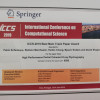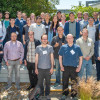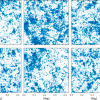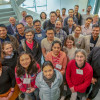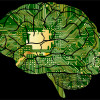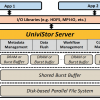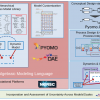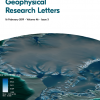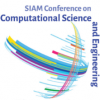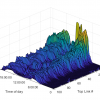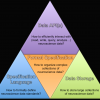News Center
CRD Researchers Nominated for Best Paper at ICPP2019
CRD’s Mauro Del Ben, Osni Marques, and Andrew Canning are developing new Eigensolver algorithms based on an iterative approach using an unconstrained energy functional scheme to improve scaling on parallel computing architectures. Read More »
Industry and CRD Partner to Build Energy Efficiency into Paint Design
Through DOE's HPC4Mfg program, PPG - one of the world's largest paint manufacturers - is collaborating with applied mathematicians in the Computational Research Division on computational models that will help optimize paint design and application to reduce energy consumption. Read More »
Berkeley Lab Researchers Win Best Paper Award at ICCS
Five Berkeley Lab researchers were recently honored with a Best Paper Award at the International Conference on Computational Science, held in Faro, Portugal, June 12-14. Read More »
CRD Staff Share Applied Math Expertise at ICIAM 2019
A number of staff from Berkeley Lab’s Computational Research Division are presenting talks and posters at the International Congress on Industrial and Applied Mathematics in Valencia, Spain, July 15-19, 2019. Read More »
CRD's Shalf Ponders the Future of HPC Architectures in ISC19 Keynote
As he prepared to head to ISC19 to give a keynote address on the topic, CRD's John Shalf shared his thoughts on what the future holds for computing technologies and architectures in the era beyond exascale. Read More »
CAMERA Hosts 2019 Ptycho Developers Workshop
Ptycho-tomography and spectro-ptychography are the most computationally intensive techniques being developed at the Advanced Light Source and light sources around the world. Read More »
ExaStar Takes Astrophysical Research to the Exascale
Within the next few years, exascale computing will take computationally intensive astrophysics research to the next level. However, to harness the power of exascale, researchers will need new code developed specifically for exascale computing. The ExaStar project has researchers from multiple DOE national labs collaborating to develop new exascale-level code. Read More »
To Pump or Not to Pump?
A team of computer and environmental scientists are developing a computational tool that will allow groundwater managers to plan and manage their precious water resources more sustainably, leading to improved resistance to droughts. Read More »
National Academies Taps Cholia for Scientific Workflows Committee
Shreyas Cholia has been invited by the National Academies of Sciences, Engineering, and Medicine to serve as a member for the Realizing Opportunities for Advanced and Automated Workflows in Scientific Research committee. Read More »
CosmoGAN: Training a Neural Network to Study Dark Matter
A Berkeley Lab-led research group is using a deep learning method known as generative adversarial networks to enhance the use of gravitational lensing in the study of dark matter. Read More »
Computational Research Division Hosts UC Merced Grad Students
On May 1, a group of students from UC Merced, all participants in the National Science Foundation’s Interdisciplinary Computational Graduate Education program, visited Berkeley Lab to learn about the many ways computing can be applied to research problems. Read More »
Envisioning the Future of Machine Learning and Data Analytics
Early to mid-career national lab mathematicians met at Berkeley Lab to discuss challenges in machine learning and data analytics and to seed new collaborations. Read More »
CRD Researchers Using Deep Learning to Help VA Identify Suicide Risk in Veterans
Researchers in Berkeley Lab's Computational Research Division are applying deep learning methods and data analytics to electronic health record data to help the Veterans Administration address a host of medical and psychological challenges affecting many of the nation’s 700,000 military veterans. Read More »
UniviStor: Next-generation Data Storage for Heterogeneous HPC
The Proactive Data Containers project team at Berkeley Lab is developing object-oriented I/O services designed to simplify data movement, data management, and data reading services on next-generation HPC architectures. Read More »
IDAES Process Systems Engineering Software Now Open Source
IDAES has released the first open-source version of its next-generation computational framework and model library, created to optimize the design of process systems engineering solutions used to model advanced energy systems. Read More »
CRD’s Ice Sheet Modeling Tool Probes Antarctic Vulnerabilities
The BISICLES ice sheet model uses high performance computing resources at the National Energy Research Scientific Computing Center (NERSC) to systematically examine where the Antarctic Ice Sheet is vulnerable and the resulting potential for large contributions to sea level rise. Read More »
New Computational Biosciences Group Aims to Build on Lab Strengths, Break Down Barriers
A new group in Berkeley Lab’s Computational Research Division (CRD) aims to tap into the lab's expertise in both computing and biosciences, crossing organizational lines to create an integrated team to develop new tools for addressing a range of scientific problems. Read More »
CRD Postdoc Posters Honored at SIAM-CSE Meeting
Two postdoctoral researchers in the Computational Research Division’s Center for Computational Sciences and Engineering won “best poster” during the recent SIAM-CSE meeting. Read More »
Mobiliti: A Game Changer for Analyzing Traffic Congestion
Berkeley Lab researchers have developed a software tool that uses supercomputing resources at the National Energy Research Scientific Computing Center to accurately simulate traffic flow throughout the San Francisco Bay Area road networks and provide estimates of the associated congestion, energy usage, and productivity loss. Read More »
NWB:N Consortium Rolls Out v2.0 of Software Ecosystem for Neuroscientists
The Neurodata Without Borders: Neurophysiology (NWB:N) project, led by Berkeley Lab, has achieved yet another milestone with the full release of NWB:N 2.0 in January. Read More »











